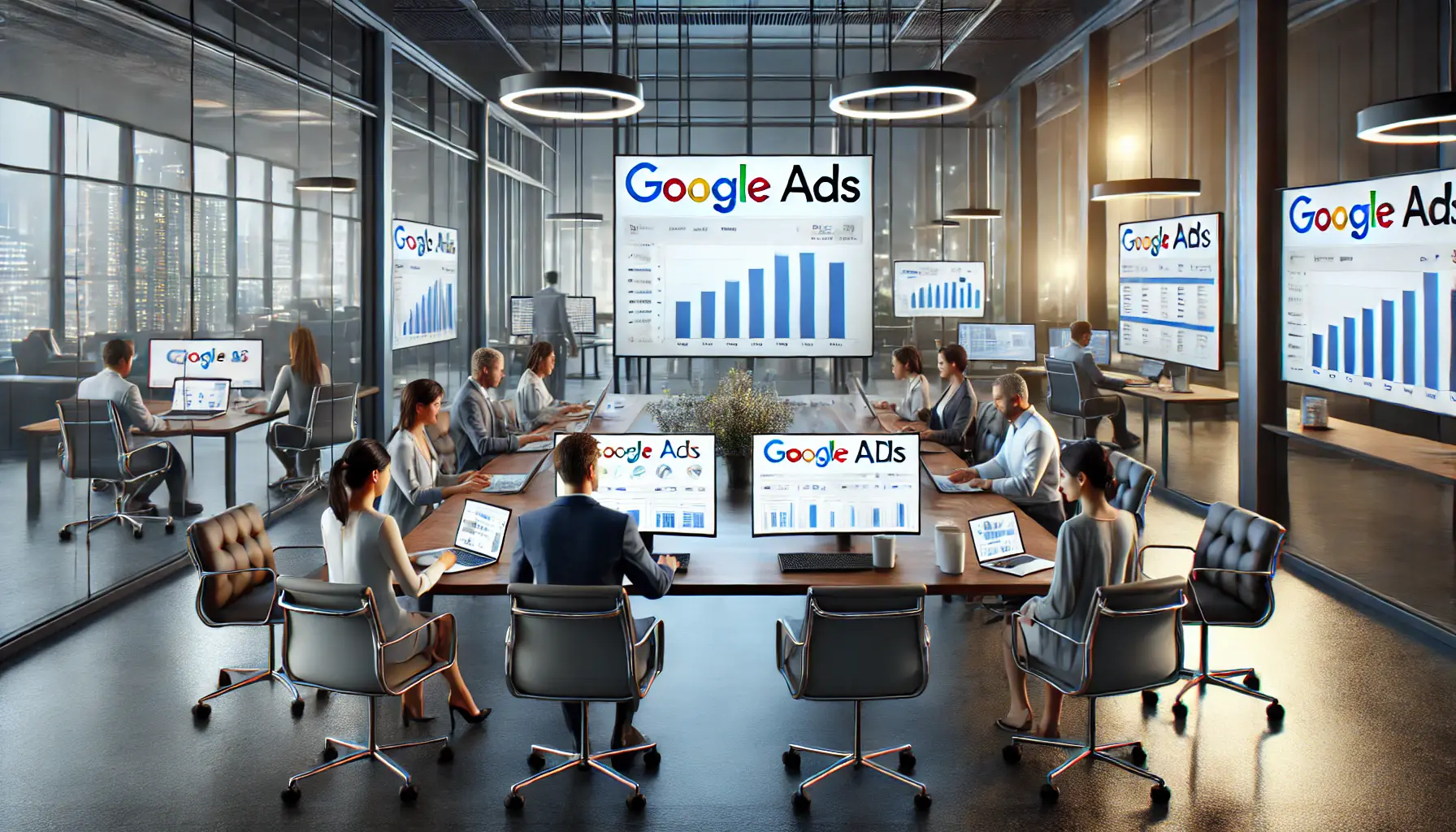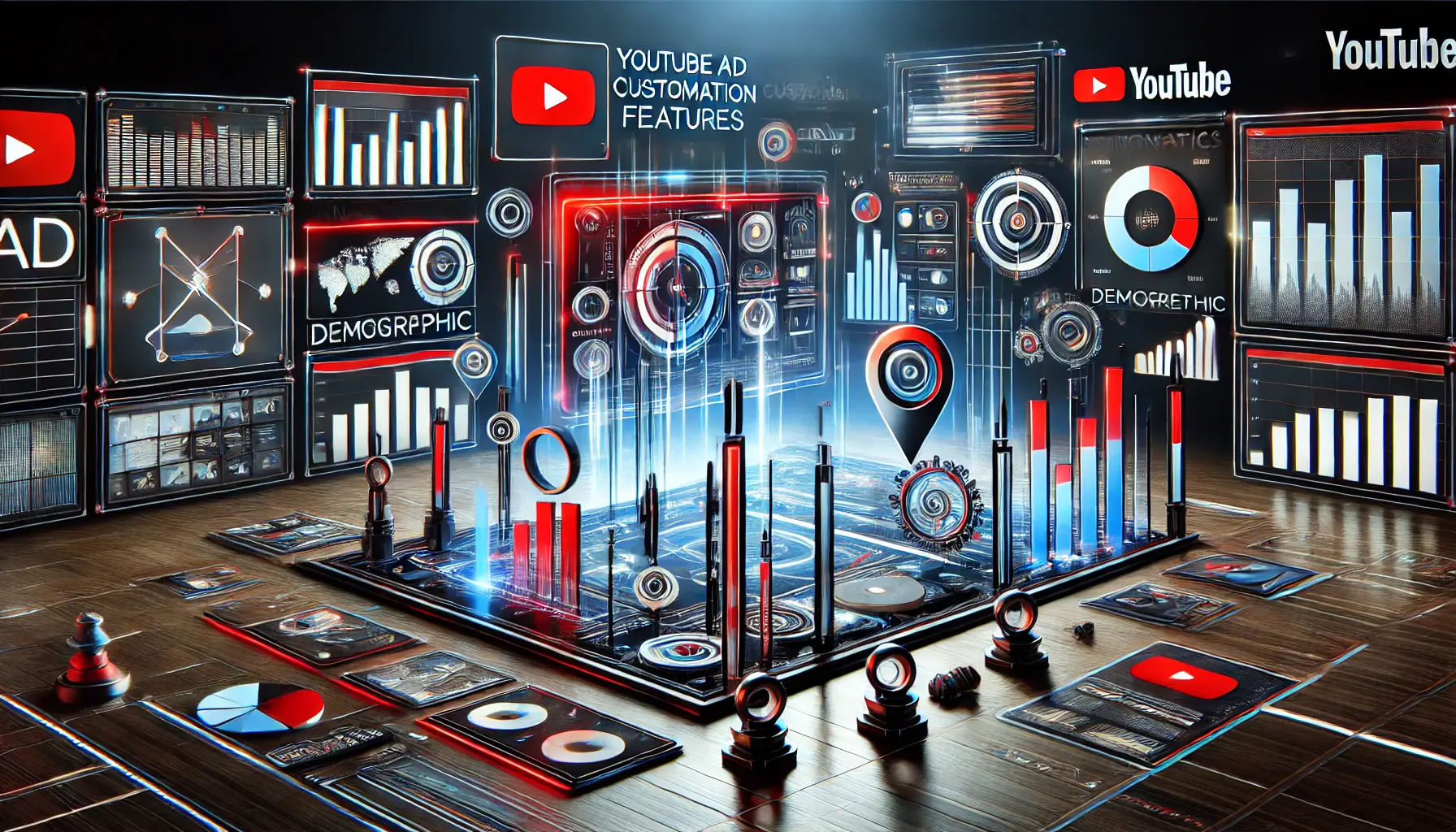Google Display Ads have revolutionized how businesses connect with their audience, offering a unique and powerful platform to showcase a brand across the internet.
Whether you are a small business owner or a global enterprise, reaching millions of users has never been so accessible.
In this article, we’ll dive into the unique features of Google Display Ads that make them a must-have tool for any digital marketer.
From their expansive network reach to their advanced targeting capabilities, there’s a lot to explore and leverage for your business success.
Expansive Network Reach
One of the standout features of Google Display Ads is their extensive network reach.
It allows your ads to appear on millions of websites, apps, and Google-owned properties like YouTube and Gmail, ensuring your brand reaches a far-flung audience.
This unparalleled reach makes sure that your brand message can show up nearly anywhere your potential customers go online.
Google Display Ads are able to reach more than 90% of internet users worldwide.
This vast coverage is made possible through the Google Display Network (GDN), which includes high-traffic websites, niche blogs, and popular mobile applications.
By utilizing this network, you can effectively ensure your business remains visible to a broad and relevant audience.

Illustration of global connectivity via Google Display Ads.
Access to Millions of Websites and Apps
The Google Display Network consists of countless websites and apps that host display ads.
This means your ad isn’t just confined to search engine results but can appear on platforms your audience frequents regularly.
For instance, your ad might show up on a popular news site, a fitness blog, or even within a mobile gaming app, amplifying your brand exposure.

Visual representation of Google Display Ads’ global reach.
Reaching Over 90% of Internet Users
Imagine having the power to reach almost every internet user globally.
Google Display Ads make this possible, giving businesses unparalleled opportunities to scale campaigns and tap into virtually any market.
Whether your target audience is in the United States, Europe, or Asia, the reach of this platform ensures your ads are seen by the right eyes.

Illustration of the seamless integration within the Google ecosystem.
Integration with Google-Owned Properties
Google’s ecosystem is vast, and with Display Ads, you gain access to some of the most frequented digital spaces.
Platforms like YouTube, Gmail, and Google Finance are all part of the Google Display Network.
This integration allows your ads to appear alongside trusted and high-quality content, enhancing your brand’s credibility and impact.
In the next section, we’ll delve deeper into the advanced targeting options that make Google Display Ads not only expansive but also highly precise in reaching your ideal audience.
Stay tuned!
Google Display Ads ensure your brand connects with over 90% of internet users through an expansive network of websites, apps, and Google-owned properties.
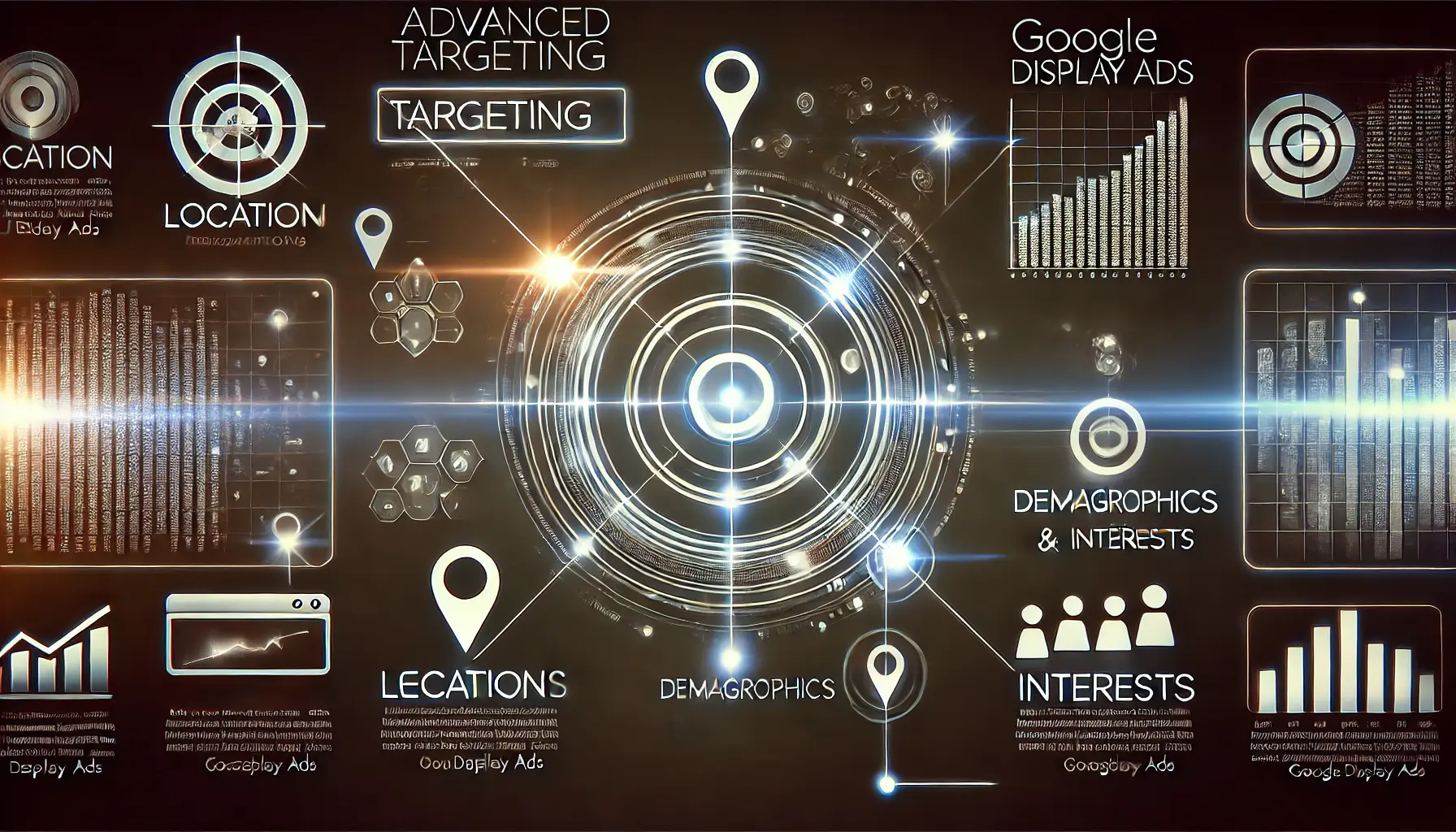
Representation of advanced targeting options for Google Display Ads.
Advanced Targeting Options
Google Display Ads come with a suite of advanced targeting options that allow you to connect with your ideal audience more precisely than ever before.
By leveraging these unique features, you can ensure your ads reach users who are most likely to engage with your brand, thereby maximizing your return on investment.

Illustration of contextual targeting in digital advertising.
Contextual Targeting
Contextual targeting enables your ads to appear on websites and apps that are relevant to your product or service.
By analyzing the content of these platforms, Google places your ads where they naturally fit, increasing the likelihood of user engagement.
For example, if you sell fitness equipment, your ads might appear on health and wellness blogs or workout tutorial sites.

Illustration of audience targeting in digital advertising.
Audience Targeting
Audience targeting allows you to reach users based on specific characteristics and behaviors.
Here are some essential methods to utilize:
- In-Market Audiences: Target users actively searching for a product or service like yours, demonstrating a higher intent to buy.
- Affinity Audiences: Engage users who have an interest in subjects related to your products, such as fitness, health, or technology.
- Life Event Targeting: Connect with users experiencing major life changes, like moving houses or getting married, where the likelihood of purchasing may increase.

Representation of remarketing in digital advertising.
Remarketing
Remarketing enables you to reconnect with users who have visited your website or app but did not convert.
By retargeting these users with personalized ads as they visit other sites, you keep your brand top of mind and encourage them to return and convert.
This approach significantly boosts the efficiency of your Google Display Ads campaigns.
By using advanced targeting options such as contextual targeting, audience targeting, and remarketing, you can deliver relevant content at the right time and in front of the right audience.
These strategies increase your chances of capturing engagement and driving conversions, ultimately leading to business success.
The following section explores the visual appeal and flexibility of Google Display Ads, showcasing how diverse ad formats can capture user attention and improve engagement.
Stay tuned!
Advanced targeting options, like contextual targeting and remarketing, allow advertisers to precisely connect with the most relevant audience, maximizing ROI.

Representation of the visual appeal and flexibility of digital advertising.
Visual Appeal and Flexibility
Google Display Ads are outstanding due to their visual appeal and flexibility in offering a diverse range of ad formats that meet different marketing objectives and audience preferences.
This versatility enables you to craft compelling advertisements that capture attention and drive engagement across the vast Google Display Network.

Illustration of diverse ad formats in digital advertising.
Diverse Ad Formats
Google provides several ad formats to suit your campaign needs:
- Responsive Display Ads: These ads automatically adjust their size, appearance, and format to fit available ad spaces, ensuring optimal performance across devices and platforms. By uploading different creative assets, such as images, headlines, logos, and descriptions, Google’s AI combines them to create ads that fit natively on the websites and apps on the Display Network. This flexibility amplifies user experience and engagement.
- Uploaded Image Ads: If you want more control over what your ad will look like, you can upload image ads in a variety of sizes and formats, including JPG, PNG, and GIF. This option allows you to maintain brand consistency and deliver a tailored message to your audience.
- Rich Media Ads: For a more interactive experience, rich media ads incorporate elements like animation, video, or clickable content, engaging users in a dynamic way that can lead to higher conversion rates.

Illustration of responsive design in digital advertising.
Responsive Design
The flexibility of Google Display Ads extends to their responsive design capabilities.
Responsive display ads automatically resize, reshuffle, and optimize to fit in just about any available ad space.
By uploading different assets into Google Ads, the platform automatically assembles the optimal combination of assets for each ad slot based on performance history.
This ensures your ads always look their best across all devices and platforms.
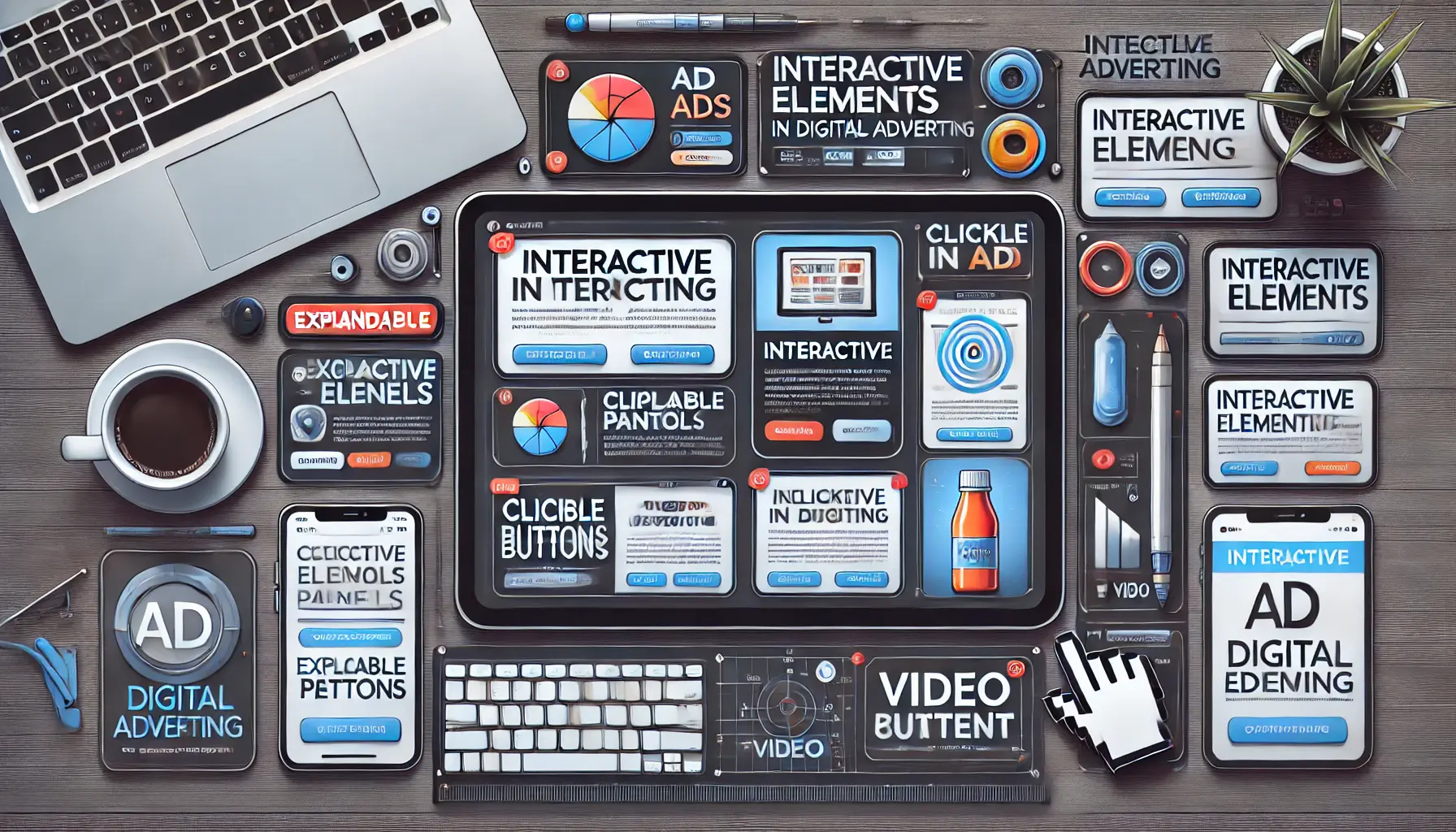
Representation of interactive elements in digital advertising.
Interactive Elements
Adding interactive elements to your display ads can significantly boost user engagement.
Features such as expandable panels, video content, or interactive forms invite users to interact with your ad, increasing interest and possibly leading to conversions.
Rich media ads enable you to create these interactive experiences, making your ads more engaging and memorable.
By leveraging the visual appeal and flexibility of Google Display Ads, you can create compelling and effective advertising campaigns that resonate with your target audience.
In the next section, we’ll explore how to measure the performance of your display ads and optimize them for better results.
Stay tuned!
With diverse ad formats and responsive designs, Google Display Ads help create visually appealing and engaging content tailored to various platforms.

Illustration of measurable performance and analytics in digital advertising.
Measurable Performance and Analytics
One of the unique features of Google Display Ads is the ability to measure performance through comprehensive analytics.
This capability allows you to track the effectiveness of your campaigns, understand user interactions, and make data-driven decisions to optimize your advertising efforts.
Representation of real-time tracking in digital advertising.
Real-Time Tracking
Google Display Ads provide real-time tracking of key metrics such as impressions, clicks, and conversions.
This immediate feedback enables you to monitor your campaign’s performance and make timely adjustments to improve results.
By analyzing these metrics, you can identify which ads resonate with your audience and allocate your budget more effectively.
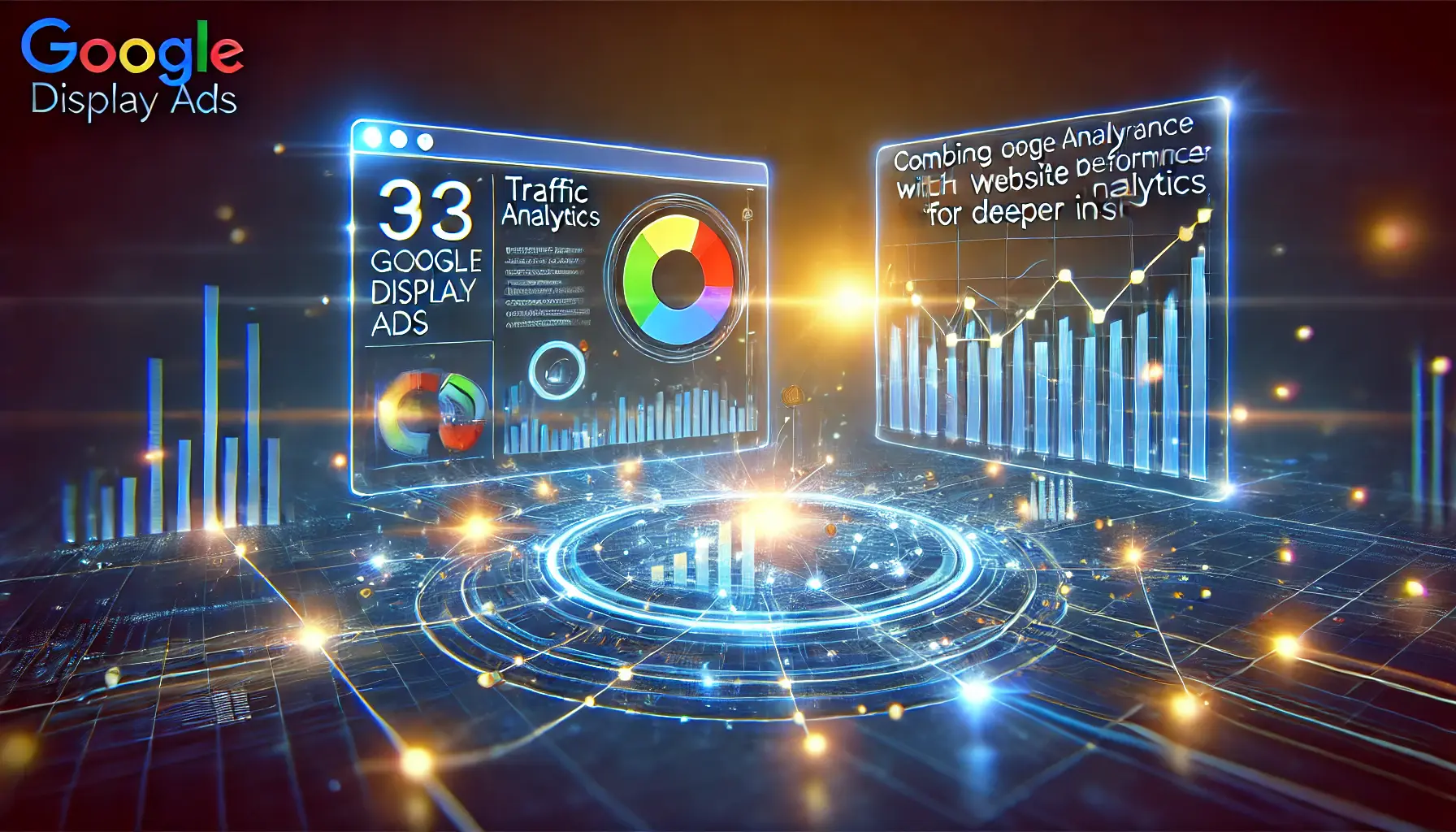
Representation of the integration between Google Display Ads and Google Analytics.
Integration with Google Analytics
Integrating your Google Display Ads with Google Analytics offers deeper insights into user behavior.
This integration allows you to:
- Understand how users interact with your website after clicking on your ads.
- Track the customer journey from ad impression to conversion.
- Identify high-performing segments and tailor your strategies accordingly.
By leveraging these insights, you can enhance your campaigns to better meet your business objectives.

Representation of AI-driven optimization in digital advertising.
AI-Driven Optimization
Google’s AI-powered tools analyze your ad performance and provide recommendations to optimize your campaigns.
Features like Smart BiddingGoogle's automated bidding strategy using machine learning to optimize conversions or ROI. use machine learning to continuously adjust your bids in real-time, aiming to maximize conversions or achieve your set return on investment.
By adopting AI-optimized bidding, you can significantly enhance productivity and achieve better ad results.
In the next section, we’ll uncover the cost-effective solutions offered by Google Display Ads to help you get the best performance from your marketing budgets.
Stay tuned!
Real-time tracking and Google Analytics integration empower advertisers with actionable insights to optimize their campaigns effectively.

Representation of cost-effective solutions in digital advertising.
Cost-Effective Solutions
Google Display Ads offer unique features that provide cost-effective solutions for businesses aiming to maximize their advertising budgets.
By leveraging these features, you can achieve significant reach and engagement without overspending.

Representation of flexible bidding strategies in digital advertising.
Flexible Bidding Strategies
Google Display Ads provide various bidding strategies to align with your marketing goals and budget constraints.
Here are a few options you can use:
- Cost-Per-Click (CPC): You only pay when a user actually clicks your ad. This option is very affordable and can help you drive more website traffic. For Google Display Ads, the average CPC ranges from $0.50 to $2.00, allowing you to efficiently manage your costs.
- Cost-Per-Thousand Impressions (CPM): With this strategy, you pay per 1,000 impressions, making it an excellent choice for brand awareness campaigns. CPM rates typically range from $0.50 to $5.00, enabling broad exposure within a manageable budget.
- Target Cost-Per-Action (CPA): This strategy focuses on conversions, allowing you to set a target CPA to control costs per acquisition effectively.

Representation of budget control and scalability in digital advertising.
Budget Control and Scalability
Google Display Ads offer unparalleled flexibility in budget management, allowing you to set daily or campaign-specific budgets that align with your financial capabilities.
This scalability ensures that businesses of all sizes can effectively use the platform without the risk of overspending.

Representation of high ROI in digital advertising.
High Return on Investment (ROI)
With advanced targeting options and engaging ad formats, Google Display Ads enable you to reach your ideal audience efficiently.
This precision targeting leads to higher engagement rates and conversions, ensuring a better return on your advertising investment.
Next, we’ll cover how integrating Google Display Ads with other marketing strategies can amplify your overall campaign effectiveness.
Continue reading!
Flexible bidding strategies and scalable budget controls make Google Display Ads accessible and efficient for businesses of all sizes.
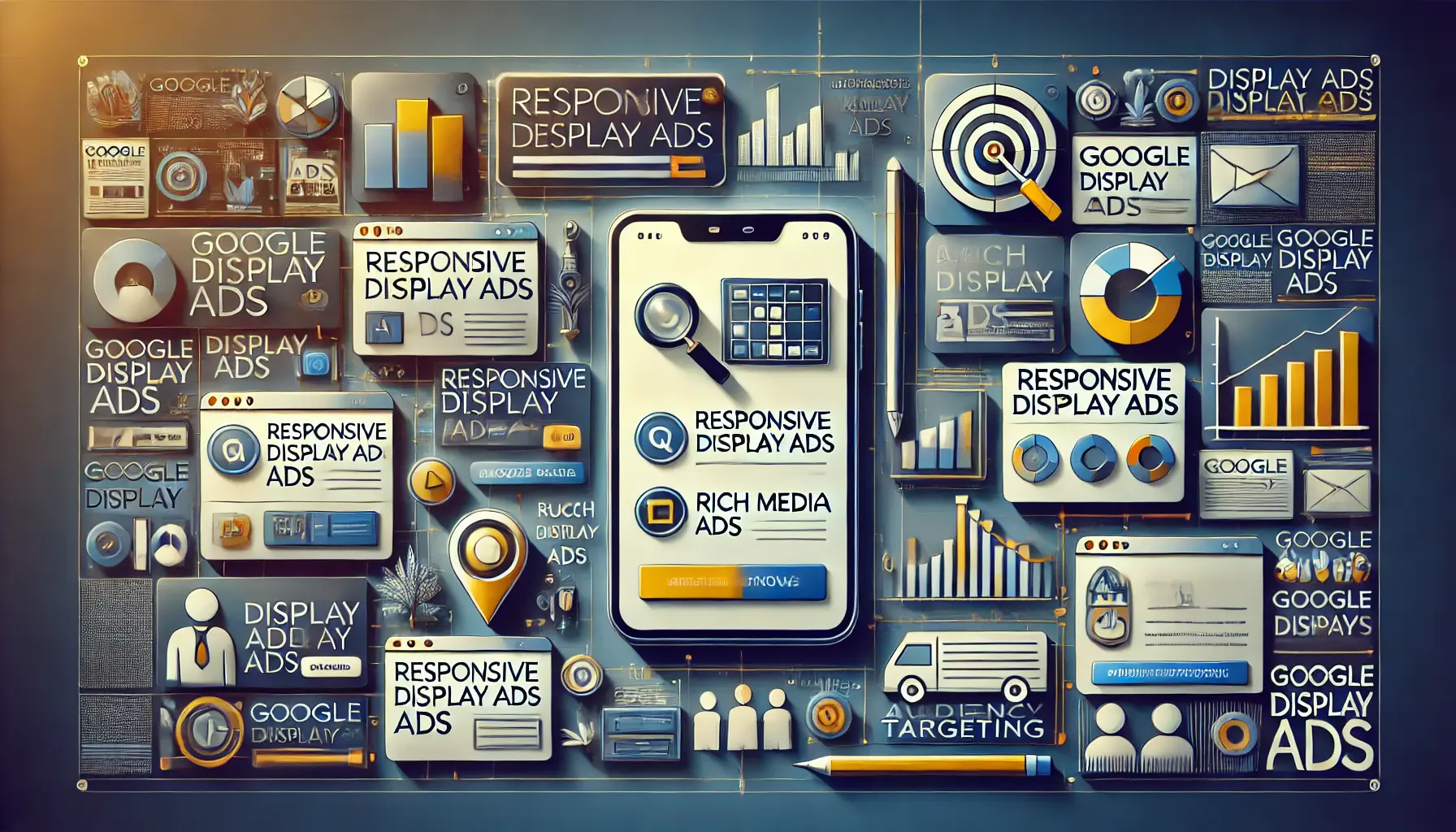
Illustration of the distinctive features of Google Display Ads.
Key Takeaways: Distinctive Features of Google Display Ads
Google Display Ads are an extraordinary channel that helps businesses build better reach, engage their audience, and deliver on their marketing goals.
By leveraging its unique features, you can optimize your advertising campaigns and gain a competitive edge in today’s dynamic digital marketing landscape.

Illustration of the unmatched network reach of Google Display Ads.
Unmatched Network Reach
With access to millions of websites, apps, and Google-owned platforms like YouTube and Gmail, Google Display Ads ensure your brand connects with a vast and diverse audience.
This expansive network helps businesses achieve maximum visibility and recognition on a global scale.

Illustration of advanced targeting options in digital advertising.
Advanced Targeting Options
The advanced targeting options available with Google Display Ads enable you to focus on reaching the right audience at the right time.
Features like contextual targeting, audience segmentation, and remarketing enhance your ability to deliver personalized and impactful messages, leading to higher engagement and conversions.

Illustration of visual appeal and flexibility in digital advertising.
Visual Appeal and Flexibility
Google Display Ads’ diverse ad formats and responsive design capabilities allow you to create visually appealing and flexible advertisements that adapt to various platforms and devices.
By incorporating interactive elements and rich media, you can capture attention and drive meaningful user interactions.

Illustration of comprehensive analytics and optimization in digital advertising.
Comprehensive Analytics and Optimization
Measuring and improving the performance of your campaigns is effortless with Google Display Ads’ real-time analytics and AI-driven optimization tools.
These features empower businesses to make data-driven decisions, allocate budgets effectively, and maximize their return on investment.

Illustration of cost-effective solutions in digital advertising.
Cost-Effective Solutions
Flexible bidding strategies like CPC, CPM, and CPA, combined with scalable budget controls, make Google Display Ads a cost-effective solution for businesses of all sizes.
These features ensure that every dollar spent on an ad is utilized effectively in realizing measurable returns.
In conclusion, these unique features make Google Display Ads a must-have for digital marketers who want to extend their brand’s reach and achieve marketing goals.
By tapping into the power of its massive network, enhanced targeting, visual flexibility, and cost-effective strategies, you can unlock new opportunities and drive your business toward success.
By leveraging Google Display Ads’ features like network reach, advanced targeting, and cost-effectiveness, businesses can achieve significant marketing success.

Illustration of frequently asked questions about Google Display Ads.
Your campaigns can be managed by an agency specialized in Google Ads, check out our service page.
Google Display Ads: Frequently Asked Questions
Below are some of the common questions and quick answers that highlight the distinguishing features of Google Display Ads.
Google Display Ads are a type of visual ad that appears through the Google Display Network on millions of websites, apps, and Google-owned properties, including YouTube and Gmail.
Display Ads are visual and appear on various websites and apps, while Search Ads are text-based and appear on search engine results pages when users search for specific keywords.
Google Display Ads offer advanced targeting options, including contextual targeting, audience targeting, and remarketing, enabling advertisers to effectively reach specific user segments.
You can measure performance using metrics like impressions, clicks, and conversions, and by integrating with Google Analytics for deeper insights into user behavior and campaign effectiveness.
Google Display Ads support various formats, including responsive display adsAds that automatically adjust size, appearance, and format to fit available ad spaces., uploaded image ads, and rich media adsInteractive ads incorporating elements like animation, video, or clickable content for higher engagement., offering flexibility in design and presentation.
Responsive display ads automatically adjust their size, appearance, and format to fit available ad spaces, combining your assets to create ads that blend seamlessly into different websites and apps.
The Google Display Network is a collection of more than 3 million websites, apps, and Google-owned properties where your display ads can appear, reaching a vast and diverse audience.
Google Display Ads offer flexible bidding strategies like CPC, CPM, and CPA, along with scalable budget controls, allowing you to set daily or campaign-specific budgets that align with your financial goals.
Yes, Google Display Ads support the use of images and videos, enabling you to create engaging and visually appealing advertisements to capture user attention.

